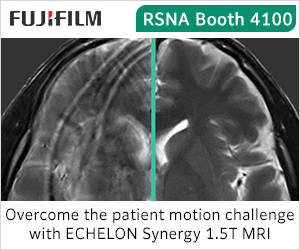|
E-Newsletter • November 2024 |
▼ ADVERTISEMENT

RSNA Preview
By Josh Hildebrand
It’s that time of the year again when radiology professionals from around the globe gather at McCormick Place in Chicago for the RSNA Annual Meeting. As per tradition, this year’s meeting will be held both virtually and in person.
The blustering chill of Sunday, December 1, ushers in sessions on AI, image interpretation, cardiac imaging education, and epilepsy imaging. As always, there are a plethora of sponsored sessions in the mix as well, including “Communication Errors in Radiology and How to Avoid Them,” sponsored by the RSNA Research Development Committee, and “Strategic Career Moves Beyond Clinical Practice,” sponsored by the American Association for Women in Radiology.
Curtis P. Langlotz, MD, PhD, will present this year’s president’s address, titled “Building Intelligent Connections.” Following, Nina Ellen Kottler, MD, MS, will present the opening session, “The Only Way to Predict the Future Is to Create It.”
Warm up Monday, December 2, with sessions on hip imaging, multienergy CT in the emergency department, multimodality thoracic aortic imaging, and prostate cancer imaging. Be sure to tune in to a few sponsored sessions as well, such as: “Planetary Health and Radiology: Actionable Steps to Decrease Our Environmental Impact,” sponsored by the RSNA Professionalism Committee, and “The ROI of AI,” sponsored by the RSNA Associated Sciences Consortium.
|
|
|
▼ ADVERTISEMENT
 |
|
▼ ADVERTISEMENT
 |
Advanced Microscope Achieves New Imaging Depths
A newly developed microscope can detail hard-to-reach neural structures at otherwise unseen depths and high resolution. Researchers at Cornell published their research in eLight.
Fluorescence-Guided Imaging Augments Nerve and Tumor Visibility
Removing head and neck squamous cell carcinoma requires absolute precision to preserve healthy tissue. With a new fluorescence-guided imaging technique developed by researchers from Oregon Health and Science University and Thayer School of Engineering at Dartmouth, this may now be easier.
Machine Learning Model Performs Poorly in Breast Cancer Characterization
A machine learning model attempting to differentiate HER2 breast cancer struggled to do so. The results of the study are published in the AJR. |
“This study represents the largest case series of patients with recurrent meningiomas treated with PRRT [peptide receptor radionuclide therapy]. Results show that PRRT is a potential treatment option for this orphan disease and allows for effective disease control. The treatment has very few side effects and offers a good quality of life for those suffering from meningiomas.”
— Alberto Bongiovanni, MD, oncologist at the IRCCS Istituto Romagnolo per lo studio dei Tumori, IRST, in Meldola, Italy, and coauthor of a study on a new peptide receptor radionuclide therapy deemed safe for treatment of advanced meningiomas |
|
|
COVER STORY
Time for a Chat About LLMs?
A recent study demonstrates ChatGPT’s potential usefulness in aiding radiologists’ interpretation of medical images.
FEATURE
Mapping a Complex Landscape
Breakthroughs with functional MRI aid physicians in better understanding and treating all forms of depression.
|
|
|
| Advertising Opportunities |
Have a product or service you want to market to radiology professionals? Utilize the reach of Radiology Today Magazine to accomplish your marketing goals. Email our experienced account executives today at sales@gvpub.com or call 800-278-4400 for more information.
|
| © 2024 Radiology Today Magazine |
|
|